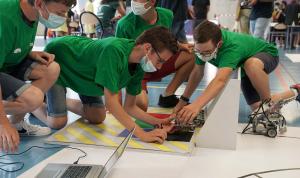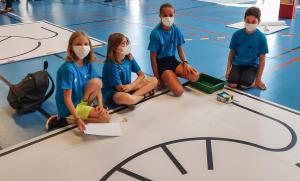The experts of tomorrow
Robotics is at the heart of every major industrial project. In ITER, the operation of mobile automated systems will play a key role in assembling machine components in the restricted environment of the assembly pit, in maintaining the installation once operations have started, and in dismantling it at the end of its life cycle. The same will be true, but on a massive scale, for the fusion industry of the future. As a consequence, scores of experts will be needed to design, manufacture and operate the robotic systems that will make fusion possible.
Chances are that a few of these future experts were present on 15 June for the grand finale of the ITER Robots competition, whose 10th edition was held this year at Collège Louis-Philibert in Le Puy-Sainte-Réparade, a village located some 30 kilometres west of the ITER site.
Organised by Agence Iter France (CEA) in partnership with the local representatives of the French Ministry of National Education, ITER Robots brings together junior and high school students (18 teams for a total of 300 students this year) in a friendly competition that mimics some of the challenges of handling actual ITER components.
Under their professor's guidance, students spend months designing and programming Lego-based robots and "training" them to perform specific tasks in and around a mockup of the ITER Tokamak. Their performance is assessed by a jury of actual robotics experts from ITER and CEA's Institute for Magnetic Fusion Research (IRFM).
"Watching you perform today didn't feel much different than observing the ITER teams presently involved in the machine assembly phase. It was the same concentration, the same coordination, the same attention to the smallest detail," said Alain Bécoulet, Head of the ITER Engineering Domain (representing ITER Director-General Bernard Bigot), in his address to the participants.
At a reduced scale, participation in ITER Robots is about measuring the challenges of handling ITER components remotely. At real-scale, it is a demonstration of the importance of teamwork and shared responsibility.



